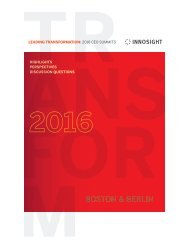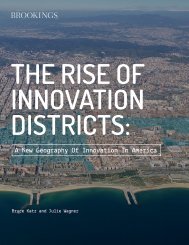TECHNOLOGY AT WORK
1Oclobi
1Oclobi
You also want an ePaper? Increase the reach of your titles
YUMPU automatically turns print PDFs into web optimized ePapers that Google loves.
80<br />
Citi GPS: Global Perspectives & Solutions February 2015<br />
The Sharing Economy<br />
Benefits of the emerging sharing economy<br />
are not showing up in productivity statistics,<br />
but they are real<br />
While productivity is at the heart of long-run growth, consumer surplus is arguably a<br />
better measurement of the benefits to societal progress. Thus, even though much of<br />
the emerging sharing economy is not captured by productivity statistics, its benefits<br />
to most people are certainly real: Wikipedia, Google, Facebook, LinkedIn, Instagram<br />
and Dropbox all contribute to the sharing economy, and they are all available for<br />
free. As the sharing part of the economy is likely to continue growing as a result of<br />
digitisation, consumers along with talented entrepreneurs will be the greatest<br />
beneficiaries of the digital age.<br />
The opportunities offered by the digital economy are immense as the Internet and<br />
smartphones make it cheaper to match supply and demand. People can now<br />
register their unused assets on various online platforms, connecting owners and<br />
users. Satellites and smartphones even make it possible for consumers to locate<br />
services nearby.<br />
This is the idea behind a range of online services that enable people to share cars,<br />
accommodation, car-parking spaces, bicycles, musical instruments, garden<br />
equipment, household appliances and other items. Such peer-to-peer rental<br />
concepts can provide additional income for owners, while providing cheaper<br />
alternatives to consumers.<br />
The most prominent sharing service is probably San Francisco-based Airbnb,<br />
allowing users to rent out their vacant rooms or homes to travellers around the<br />
world. Recently valued at $10 billion and with reported revenue of $250 million last<br />
year, the company shows how beneficial the sharing economy can be to talented<br />
entrepreneurs. Yet the benefits to consumers are equally substantial: the platform<br />
reached 10 million transactions last year in 192 countries.<br />
The way Airbnb provides cheaper accommodation, car-sharing concepts provide<br />
new alternatives to commuters. While some companies, such as Buzzcar and<br />
RelayRides, offer peer-to-peer car-rental services allowing consumers to use<br />
somebody else’s car for a fee, there are now also taxi-like services. 124 Companies<br />
like Uber use smartphone apps with satellite location to connect drivers and<br />
passengers, and provide a cheaper alternative to traditional taxi companies.<br />
The sharing economy is not merely the<br />
result of digital technologies, but also from<br />
clever ways to build trust<br />
The rise of the sharing economy is however not merely the result of digital<br />
technologies connecting people: it is as much a result of how they can be used in<br />
clever ways to build trust. A decade ago, when eBay started, people were still<br />
hesitant to provide things like their credit card details to online marketplaces. That is<br />
no longer a major obstacle. Secure Internet payment systems have been crucial,<br />
but also transparent rating systems. Home owners that register on Airbnb offering<br />
accommodation to strangers rely heavily on users’ past ratings, and travellers<br />
staying in a strangers’ flat can read reviews from previous guests. In addition, some<br />
services integrate Facebook, allowing users to check if they have mutual friends.<br />
The sharing economy still has much more potential. Governments could start<br />
unlocking some public assets, like publicly owned vehicles, providing benefits to<br />
communities as well as tax payers. Furthermore, as the sharing economy allows<br />
people to access more things cheaper or even for free, leisure may also become<br />
more attractive.<br />
124 The Economist (2013).<br />
© 2015 Citigroup










